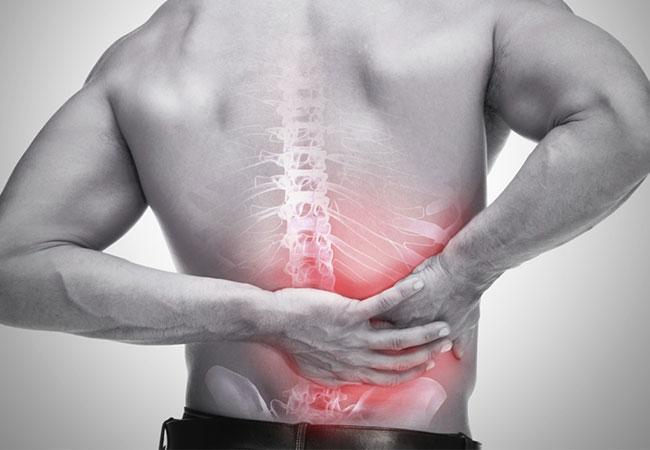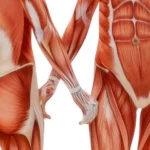The Quiet Ache That Gets Louder with Every Pound
Let’s be real — weight gain happens. Whether it’s from stress eating, a break in your workout routine, a new job, or just life piling on, the scale creeps up. But something else starts creeping in too: back pain.
At first, it’s just a twinge when you get out of bed. Then it turns into a full-blown ache after sitting at your desk. Before long, you’re stretching constantly, popping Advil, maybe even canceling plans.
And you start to wonder — Is my weight gain actually messing up my back?
Short answer? Yes, it could be.
Let’s break down how your body carries extra weight, why your back takes the brunt of it, and what you can do right now to feel better — no shame, no extremes, just real relief.
✅ Key Takeaways
-
Even modest weight gain can strain your back, especially the lower spine.
-
Extra weight shifts your center of gravity, throwing off posture and core stability.
-
Belly fat and visceral fat are especially tough on spinal alignment.
-
You don’t need a perfect body to reduce pain — small changes in strength, habits, and support go a long way.
Why Does Weight Gain Hurt Your Back?
Let’s get into the mechanics — literally.
Your spine is designed to carry your body’s weight and keep everything aligned. But when you gain weight — especially around your belly or hips — your center of gravity shifts forward. Your spine, especially your lumbar region (aka lower back), has to work harder to keep you upright.
That extra strain causes your spine’s natural curve to deepen, which can:
-
Compress your intervertebral discs (those spongy shock absorbers between vertebrae)
-
Tighten the muscles around your lower back
-
Overload your facet joints (the little hinges that let your back move)
Basically, your back gets pulled out of alignment, your muscles get tired from compensating, and pain starts to creep in.
“Carrying extra weight, particularly in the midsection, can contribute to lower back pain by increasing strain on the spine and weakening abdominal muscles.” — Mayo Clinic
Source
The Vicious Cycle: Pain Makes It Harder to Move, So You Gain More
Here’s what no one tells you: back pain from weight gain isn’t just physical — it’s emotional.
You start avoiding movement because it hurts. Maybe your workouts fall off. Maybe even a short walk feels like a chore. You feel stiff, drained, and discouraged. And when moving less becomes your new normal, the weight keeps piling on — making the pain worse.
This is how the cycle begins:
Weight Gain → Back Pain → Less Movement → More Weight Gain → Worse Pain
But cycles can be broken — gently.
How Much Weight Gain Can Trigger Back Pain?
You don’t need to gain 50 pounds for your back to start complaining.
Even 5 to 10 extra pounds, especially in your abdomen, can shift your posture enough to cause noticeable discomfort.
According to a 2020 study published in The Spine Journal, individuals with a higher body mass index (BMI) were significantly more likely to experience chronic lower back pain. The risk increased with each jump in BMI category (normal → overweight → obese).
📊 Fun Fact: For every pound of excess weight, your spine feels up to 4 extra pounds of pressure when walking or standing.
— Harvard Health Publishing
That means 10 extra pounds = 40 more pounds of pressure on your back.
Where You Carry Weight Matters
All weight isn’t equal when it comes to back strain.
-
Belly fat: This is the most common culprit. It pulls your pelvis forward (a condition called anterior pelvic tilt) and increases curvature in the lower spine.
-
Upper body weight: Can cause rounded shoulders, hunched posture, and upper back or neck pain.
-
Hips and thighs: Less directly related to back pain, but can alter gait and leg alignment, leading to compensatory tension in the lower back.
Visceral fat — the deeper fat that surrounds organs — may also promote inflammation, which can make pain and joint problems worse over time.
Real People, Real Struggles
Jen, 38, gained 15 pounds during a stressful year of remote work and caregiving. “I wasn’t doing anything extreme — just sitting more and comfort eating,” she says. “But my back was killing me. I finally saw a physical therapist who said, ‘Your core muscles are completely deactivated.’ That was my wake-up call.”
Marcus, 42, used to run 5Ks. After a knee injury, he stopped moving much and put on 20 pounds. “I started waking up with lower back pain every day. I thought it was age. But really, it was the weight I wasn’t built to carry.”
7 Ways to Reduce Back Pain from Weight Gain (Without Crash Diets)
1. Strengthen Your Core — Gently
Your core isn’t just abs — it’s the whole muscular system that supports your spine. Weak core = unstable back.
-
Try low-impact moves like pelvic tilts, dead bugs, or bird-dog exercises.
-
Even 5–10 minutes a day can retrain those support muscles.
Need help? Check out Harvard’s simple core workout (no gym needed).
2. Walk More — Start Where You Are
Walking reduces inflammation, boosts circulation, and activates stabilizing muscles.
-
Start with 5–10 minutes, especially after meals.
-
Add time weekly, not intensity.
You don’t need fancy gear — just shoes that feel good and a small window of motivation.
3. Fix Your Sitting Posture
If you work at a desk, posture is everything.
-
Sit tall, with feet flat on the floor.
-
Keep your screen at eye level.
-
Use lumbar support (a rolled-up towel works!)
A few posture tweaks can take enormous pressure off your lower back.
4. Stretch Tight Hips and Hamstrings
Extra weight can tighten your hip flexors and hamstrings, yanking your pelvis forward.
-
Try hip bridges, knee-to-chest, or cat-cow stretches.
-
Stretch gently, especially in the morning or after sitting.
5. Lose Weight Gradually — No Shame, No Crash Diets
If weight is contributing to your pain, even modest weight loss (5–10%) can help.
-
Focus on real food, fiber, protein, and hydration.
-
Avoid extremes — your back needs nutrients to heal.
According to the National Institutes of Health, just 5% weight loss can reduce strain on joints and improve mobility.
Source
6. Supportive Shoes Matter More Than You Think
Worn-out shoes = poor posture = extra spinal pressure.
-
Choose supportive, cushioned shoes — especially for walking.
-
Avoid unsupportive flats or heavy boots for long periods.
You’re not vain for caring about footwear — your spine will thank you.
7. Talk to a Pro if the Pain Persists
Back pain that lingers for more than a few weeks, worsens, or limits your movement deserves professional care.
-
Physical therapists can retrain your movement patterns.
-
Doctors can check for herniated discs or spinal issues.
-
Don’t suffer in silence — your body deserves attention.
You Deserve to Feel Good in Your Body
Weight gain doesn’t make you “bad.” And back pain isn’t some punishment. They’re both signals — not shame.
If your back is aching and your jeans feel tighter, your body might be waving a flag saying, Hey, I need some care here.
Start small. Support your spine. Nourish yourself. Move a little more. Be kind — not just to your back, but to your whole self.
And remember: Relief is possible — even without dropping 50 pounds or joining a gym.
🙋♀️ FAQ: Weight Gain & Back Pain
1. Can a 10-pound weight gain cause back pain?
Yes, especially if the weight is carried in your belly. Even small weight increases can shift posture and strain your lower back.
2. Does losing weight help back pain go away?
Often, yes. Studies show that losing even 5–10% of body weight can reduce back pain significantly, especially when combined with movement and posture work.
3. Is back pain from weight gain permanent?
Not usually. With gentle movement, strengthening, and weight management, most people find relief.
4. What’s the best exercise if my back hurts?
Walking, swimming, or low-impact core exercises like bird-dog or wall sits are great. Avoid anything high-impact until your pain improves.
5. Should I see a doctor for back pain after weight gain?
If your pain lasts more than a few weeks, gets worse, or comes with numbness/tingling, definitely check in with a doctor or physical therapist.
6. Can being overweight cause herniated discs?
Extra weight can increase spinal compression, raising the risk of disc issues — but other factors like posture and genetics play a role too.
7. What kind of shoes help with back pain?
Supportive walking or running shoes with arch support and cushioning help reduce spinal pressure during movement.
8. How do I sit properly to avoid back pain?
Sit with your back supported, knees at 90 degrees, feet flat, and your screen at eye level. Use a lumbar pillow or rolled towel for lower back support.
9. Can belly fat cause back pain even if I’m not overweight overall?
Yes. Central fat alters posture and increases spinal curvature even if your overall weight is normal.
10. Do back braces help if I’ve gained weight?
They can offer temporary support, but they won’t fix the root issue. Focus on core strength and posture long-term.
🔗 Credible Sources
Want more clear, honest tips about your health, posture, and energy?
👉 Explore more real-life guides at Upvolta.com — your no-BS source for feeling better in your body.


